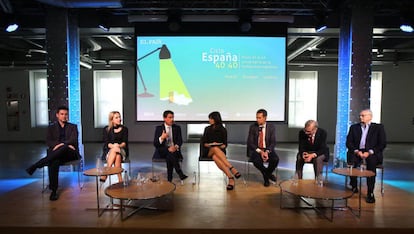As it happened: EL PAÍS hosts dialogue on the future of Spain in Europe
Jean-Claude Juncker and Nobel laureate Mario Vargas Llosa among the speakers who discussed Europe’s future

Scroll down to read our live updates as the event happened.
Politicians, journalists, writers and business leaders took part today in the forum Spain in Europe: A Common Future, organized by EL PAÍS in Brussels. The panel discussion looked at the challenges faced by contemporary Europe and was organized as part of Spain 40-40, a cycle that commemorates the 40th anniversary of Spanish democracy.
Populism, for now, has triumphed in Europe. And the European Union, despite the doomsday warnings, has grown more than the United States and United Kingdom – its highest rate in more than 10 years. The scars of the Great Depression remain but today the crisis in Europe is less about existentialism and more about territory.
Political and economic uncertainties are easing. This is the case even in Spain, which was forced to ask for a bailout of more than €40 billion in 2012 but is now one of the EU’s best performing economies – despite the ongoing issue of unemployment, which is still above 16%, and high levels of public and private debt. When added to the Catalan independence push, this makes for a cocktail of political and economic uncertainty.
The president of the European Commission, Jean-Claude Juncker, and former Spanish Prime Minister Felipe González took part in a discussion on Governing Europe today. Nobel-prize winning author Mario Vargas LLosa and Juan Luis Cebrián, an academic and chairman of Grupo PRISA, the parent group of EL PAÍS, also shared their thoughts.
A forum on how to build Europe from Spain was attended by Joaquín Almunia, the former vice president of the European Commission, Ana Palacio, a former Spanish government minister, Ignacio Faus from global consulting firm KPMG, and Itxaso del Palacio from Microsoft. And a second panel, sponsored by BBVA, Iberdrola, Iberia, NH Hotel Group, Repsol, Santander and Telefónica, was presented by EL PAÍS editor-in-chief Antonio Caño and closed by the Spanish Foreign Minister Alfonso Dastis.

That concludes our live coverage of today's EL PAÍS event, thanks for reading. We will be back tomorrow morning with a full write-up.

Dastis concludes: "Spain is indissolubly united to Europe, and Europe cannot be understood without Spain. But this is not the time to cross our arms. We need to go further. The world is changing before our eyes. For this task, Europe can count on Spain and the Spanish. Europe is our ambition."

Dastis issues a call to be closer to citizens: "We cannot continue to build Europe without the support of the people. We are going to develop a program of consulations for the people."

Dastis says Europe could become irrelevant if changes do not take place: “By not being there, we risk not being at all. We are seeing actors at our borders with principles that are very different to ours. If we want to be actors in the international arena, our public opinions and parliaments must drop the rhetoric and make the necessary sacrifices in money, national sovereignty and risks. The alternative is smallness and dependence.”

Dastis: “Europe is getting smaller. Our models and principles are being questioned and national egotisms are being rolled out. There is instability at nearly all our borders. Internally, we are still divided over small problems, if we look at them from a global perspective.”

Foreign Minister Alfonso Dastis, the last speaker of the day, takes the podium.

Former Spanish Prime Minister calls for more effort to ensure cybersecurity.

Juncker: “Europe must be more social; it must fight precariousness, inequality. Those of us who launched the euro were thinking about reducing inequality.”

Juncker on Brexit: "We have to explain to our English friends that it is the United Kingdom that is leaving the EU and not the opposite. It is going to be difficult to maintain European unity in the second part of the negotiation. We have to have simple ideas. We are talking about a complex way to hide the idea that we have simple thoughts. The United Kingdom mus respect the fact that they have decided to go. Brexit is Brexit."

Juncker: “We have to stop repeating that there are winners and losers in Europe, and that governments come to Brussels to win or lose. That feeds populism.”

Felipe González on the distance between the EU institutions and citizens: "We have to reach citizens to explain to them that there are magnificent things in the EU that they are not aware of because we don't explain them to them or they are explained in a complicated way."

Felipe González: “No government is as transparent as EU institutions, but the vocabulary creates a distance with society.”

Juncker on East-West differences in the EU: "It's very difficult to love the others. It's easier to love oneself," he jokes. "In Strasbourg, when they go to Paris, they still say, "I'm going to France." When the Hungarian Prime Minister talks continuously of 'Brussels, Brussels,' you have to defend yourself. But we are friends despite having had terrible debates."

Felipe González: "For Spain, Europe was the solution. All of the issue of progress, the political and the economic objectives of the EU in the medium term converge with the aspirations and objectives of Spain."

Juncker recalls his visits to Spain and how he once took part in a street demonstration against Franco in Luxembourg. He praises the Spanish transition. “Spain has known how to transform a dictatorial regime into a democracy.”

Felipe González, former Spanish Prime Minister, is now talking with EU Commission chief Jean-Claude Juncker. The topic is “Governing Europe today”

Enrique Medina (Telefónica): “We are going through a revolution in which large companies such as ourselves who live off a business that works partly through inertia have had to adapt very quickly.”

Rufino Pérez (NH Hotel Group): “Spain has just become the second top world tourism destination. And that is not just because of sand and sun. We are able to export hotel excellence.”

The second panel discussion is about to begin. The speakers are Enrique Medina (Telefónica), Rufino Pérez (NH) and Verónica Pascual (ASTI). The topic is “Competing in a global world.”

Ana Palacio says that Europeans’ biggest deficit is a lack of self-confidence. “We have a role to play in the future. I think that our societies do not know it. We need to make progress inside Europeans’ heads, because otherwise we will be left with nationalisms.”
Tu suscripción se está usando en otro dispositivo
¿Quieres añadir otro usuario a tu suscripción?
Si continúas leyendo en este dispositivo, no se podrá leer en el otro.
FlechaTu suscripción se está usando en otro dispositivo y solo puedes acceder a EL PAÍS desde un dispositivo a la vez.
Si quieres compartir tu cuenta, cambia tu suscripción a la modalidad Premium, así podrás añadir otro usuario. Cada uno accederá con su propia cuenta de email, lo que os permitirá personalizar vuestra experiencia en EL PAÍS.
¿Tienes una suscripción de empresa? Accede aquí para contratar más cuentas.
En el caso de no saber quién está usando tu cuenta, te recomendamos cambiar tu contraseña aquí.
Si decides continuar compartiendo tu cuenta, este mensaje se mostrará en tu dispositivo y en el de la otra persona que está usando tu cuenta de forma indefinida, afectando a tu experiencia de lectura. Puedes consultar aquí los términos y condiciones de la suscripción digital.









































